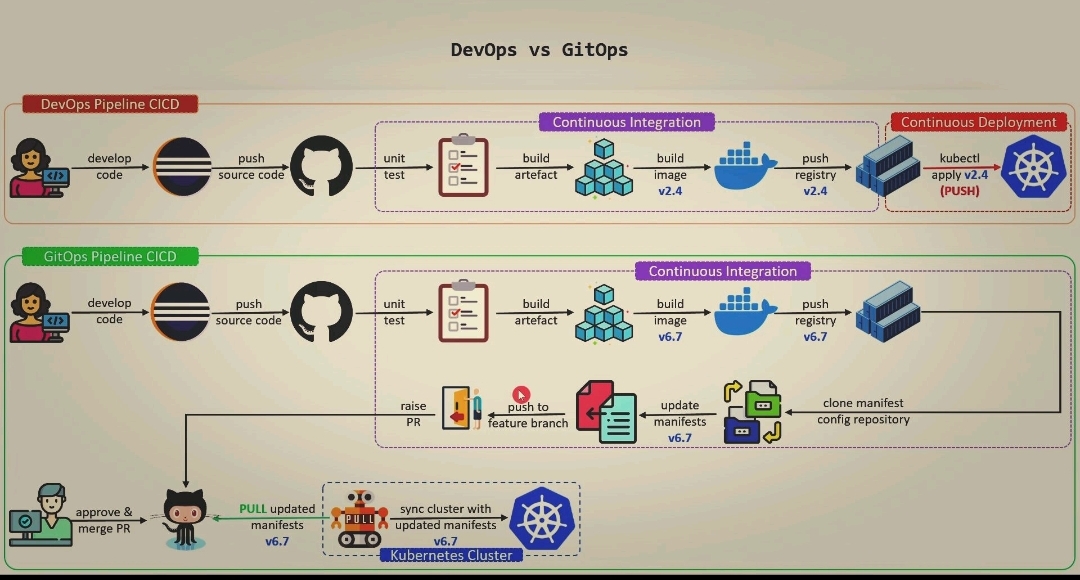GitOps vs. DevOps: Understanding the Key Differences in Software Delivery
 mohamed nasser
mohamed nasser
Both DevOps and GitOps aim to streamline software delivery, but each approach has its unique principles and workflows. While DevOps focuses on collaboration and automation, GitOps emphasizes declarative configuration and uses Git as the single source of truth for managing infrastructure. Let’s dive into how these methodologies differ and what each brings to the table.
DevOps Pipeline: The Push-Based Model
In the traditional DevOps model, the pipeline follows a push-based approach where the code moves through several steps to reach the Kubernetes cluster:
1. Code Flow: Developers push code changes to a central repository, such as GitHub. This triggers a series of Continuous Integration (CI) steps, including unit tests, artifact building, and container image creation.
2. Deployment: Once the container image is created, it’s stored in an image registry. From there, a developer or automated script uses kubectl apply commands to push the deployment to Kubernetes manually. This requires active intervention and follows a push model, where the deployment is directed into the cluster.
Key Points of DevOps:
Emphasizes rapid deployment cycles.
Provides flexibility for human intervention in the deployment process.
Requires some manual oversight, which allows for faster adjustments and troubleshooting when needed.
GitOps Pipeline: The Pull-Based Model
GitOps takes a different approach with a pull-based deployment model. Here’s how it works:
1. Code and Manifest Separation: Developers work on code changes and create a Pull Request (PR) that includes updates to configuration manifests (e.g., YAML files). The PR is reviewed and merged into a configuration repository (often a separate Git repository).
2. Automated Sync: Once the configuration repository is updated, GitOps tools automatically pull these changes into the Kubernetes cluster. The cluster continuously syncs with the repository, aligning its state to match the configurations defined in Git.
Key Points of GitOps:
The repository acts as the single source of truth for the cluster configuration, reducing discrepancies.
Promotes Infrastructure as Code (IaC), with a focus on declarative configuration.
Automates deployments through the pull-based model, which enhances consistency and minimizes human error.
Key Differences Between DevOps and GitOps
Deployment Model:
DevOps: Follows a push-based model with manual or script-driven deployment.
GitOps: Uses a pull-based, automated deployment model.
Cluster Sync:
DevOps: Requires manual updates to sync changes with the cluster.
GitOps: Auto-syncs the cluster with the repository, keeping the desired state consistent.
Speed:
DevOps: Enables fast deployment cycles with more hands-on control.
GitOps: Supports automated deployment cycles, enhancing consistency and reducing manual intervention.
Single Source of Truth:
DevOps: Central code repository serves as the source.
GitOps: Git repository acts as the definitive source of truth for configuration and cluster state.
Configuration Focus:
DevOps: Emphasizes CI/CD pipeline steps and manual configurations.
GitOps: Prioritizes declarative Infrastructure as Code (IaC), keeping infrastructure configuration consistent with code.
DevOps vs. GitOps: When to Choose Each
Choose DevOps if you need flexible, rapid deployments with hands-on control over deployment cycles. DevOps allows for faster cycles and is well-suited for projects that benefit from direct intervention during releases.
Choose GitOps if your focus is on automation and infrastructure consistency. GitOps provides a robust system for keeping infrastructure state in sync with configurations and is ideal for teams looking to minimize manual processes.
In Summary
DevOps focuses on speed and direct deployment control, making it great for teams looking to release rapidly.
GitOps simplifies deployment and cluster state management by treating Git as the single source of truth, ensuring your Kubernetes clusters are always in sync with configuration.
In modern software delivery, both DevOps and GitOps have their strengths. Choosing the right approach depends on whether you prioritize flexible, fast deployments or automated, consistent infrastructure management.
#DevOps #GitOps #Kubernetes #Automation #CICD #SoftwareDeployment #CloudNative #InfrastructureAsCode
Subscribe to my newsletter
Read articles from mohamed nasser directly inside your inbox. Subscribe to the newsletter, and don't miss out.
Written by

mohamed nasser
mohamed nasser
Devops & Cloud Engineer | 3× AWS | 1× GCP | Terraform certified | 1x ArgoCD | NTI (Cloud Security)